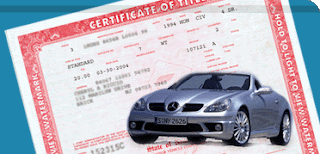 What you don't know can hurt you. It's true in life. It's true in car titles too.
What you don't know can hurt you. It's true in life. It's true in car titles too.
Bob Eppes spent over 20 years working odometer fraud for the federal government in Kansas City. Recently he turned me on to a web site that says more about title branding and types than anything I've ever seen. No matter what state or US territory you are in, if you're going to buy a used car or truck, you need to know how to understand the codes and brands that can show up on the vehicle that you're about to pay thousands of dollars for --- before you plunk down your money!
What makes it tough is that each state (or US territory) has its own unique title "brand" and code process. That's where some sort of "brand," or often a 2 digit code, is put on the title that discloses something about the vehicle itself, but only if you know how to read it.
Sometimes there are only a few types of titles, like Puerto Rico where everything is either a clean title or a salvage title and nothing in between. Other places, like Pennyslvania, have dozens of different types of titles. Well, actually they've got over 150 there (talk about confusing).
These title types or brands can often disclose whether the vehicle is a rebuilt wrecked car, a flooded vehicle, a Lemon Law buyback, or an unrebuildable salvage junkyard car, among a lot of other things.
Sometimes the "brand" on the title is pretty clear, like with most Lemon Law buyback brands that warn the vehicle was bought back because the vehicle couldn't be fixed by the manufacturer in a reasonable time. In Ohio that would read "BUYBACK: THIS VEHICLE WAS RETURNED TO THE MANUFACTURER BECAUSE IT MAY NOT HAVE CONFORMED TO ITS WARRANTY" but the wording can be different in different states.
More often the title can have a small code notation on it, often just a couple of letters, that can provide important historical background info on the vehicle. Your local car dealer knows how to read the codes. Do you? Well, here's help.
For a list of the title brands and codes for you state, click here. This is a website set up by one of the larger auto auction yards so that everyone knows what the lingo is for cars they are selling there. The unspoken message is that even the auto auction yard knows the codes can be mysterious and confusing.
Don't get taken. Insist on looking at the actual title for any used motor vehicle you are thinking of buying --- before you hand over your hard-earned money. But if you got taken by a crooked car dealer (and our series last week on crooked car dealers showed you how they even steal from each other) call us, 1-888-331-6422 Toll Free. Or fax or email us right now. We can probably help you get your money back with no cost to you.
We go after car dealers (and manufacturers) every day. It’s what we do.
ABOUT THE AUTHOR
Known nationwide as a leading Lemon Law attorney, Ronald L. Burdge has represented literally thousands of consumers in "lemon" lawsuits and actively co-counsels and coaches other Consumer Law attorneys. From 2005 through 2018, attorney Ronald L. Burdge has been named as the only Lemon Law Ohio Super Lawyer by Law and Politics magazine and Thomson Reuters Corp., Professional Division. Burdge restricts his practice to Lemon Law and Consumer Law cases. The Ohio Super Lawyer results are published annually in the January issue of Cincinnati Magazine. Ronald L. Burdge was named Consumer Law Trial Lawyer of the Year 2004 by the National Association of Consumer Advocates, the nation's largest organization of consumer law private and government attorneys. "Your impact on the auto industry has been magnified many times over because of the trail you blazed for others," stated NACA's Executive Director, Will Ogburn. Burdge has represented thousands of consumers in Ohio, Kentucky and elsewhere since 1978 and is a frequent lecturer to national, state and local Bar Associations and Judicial organizations. Burdge is admitted to Ohio's state and federal courts, Kentucky's state courts, and Indiana's federal courts. Other court admissions are on a "pro hac" temporary, case by cases basis.